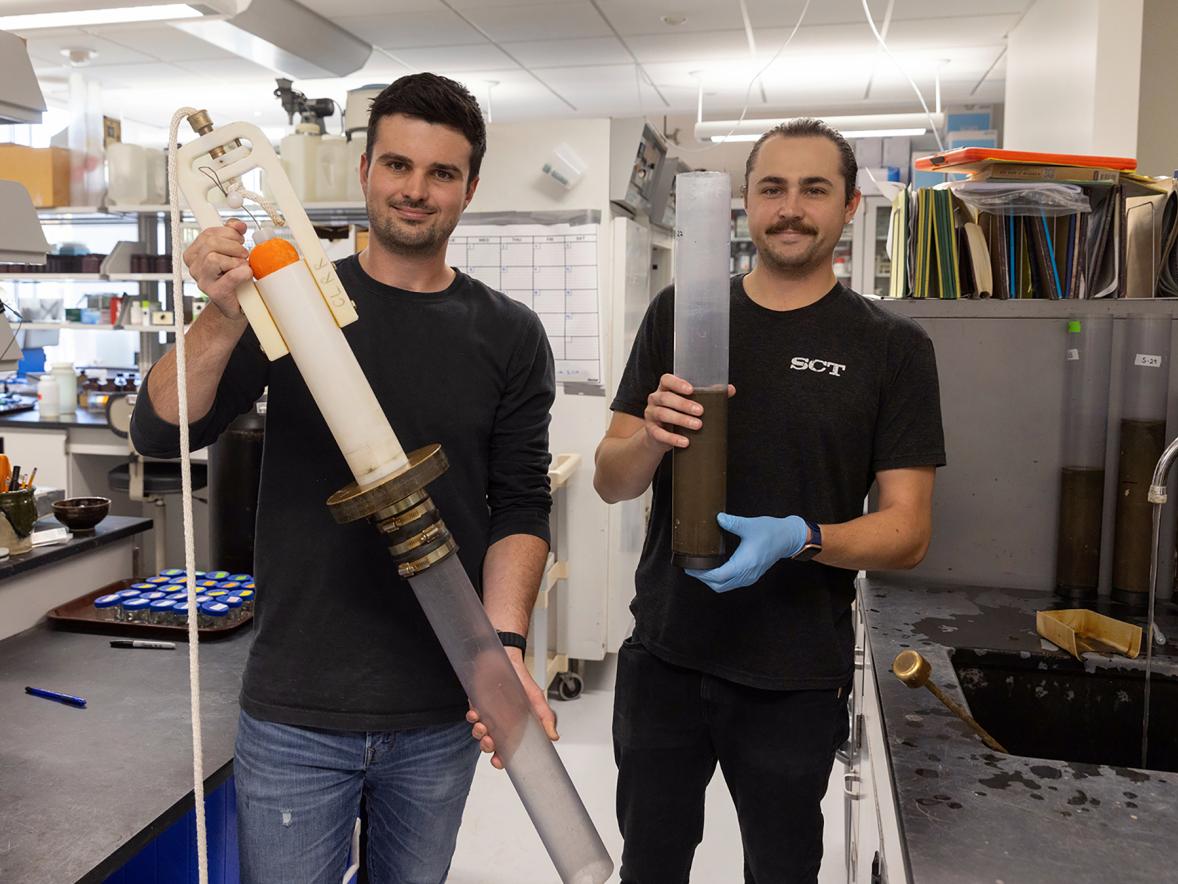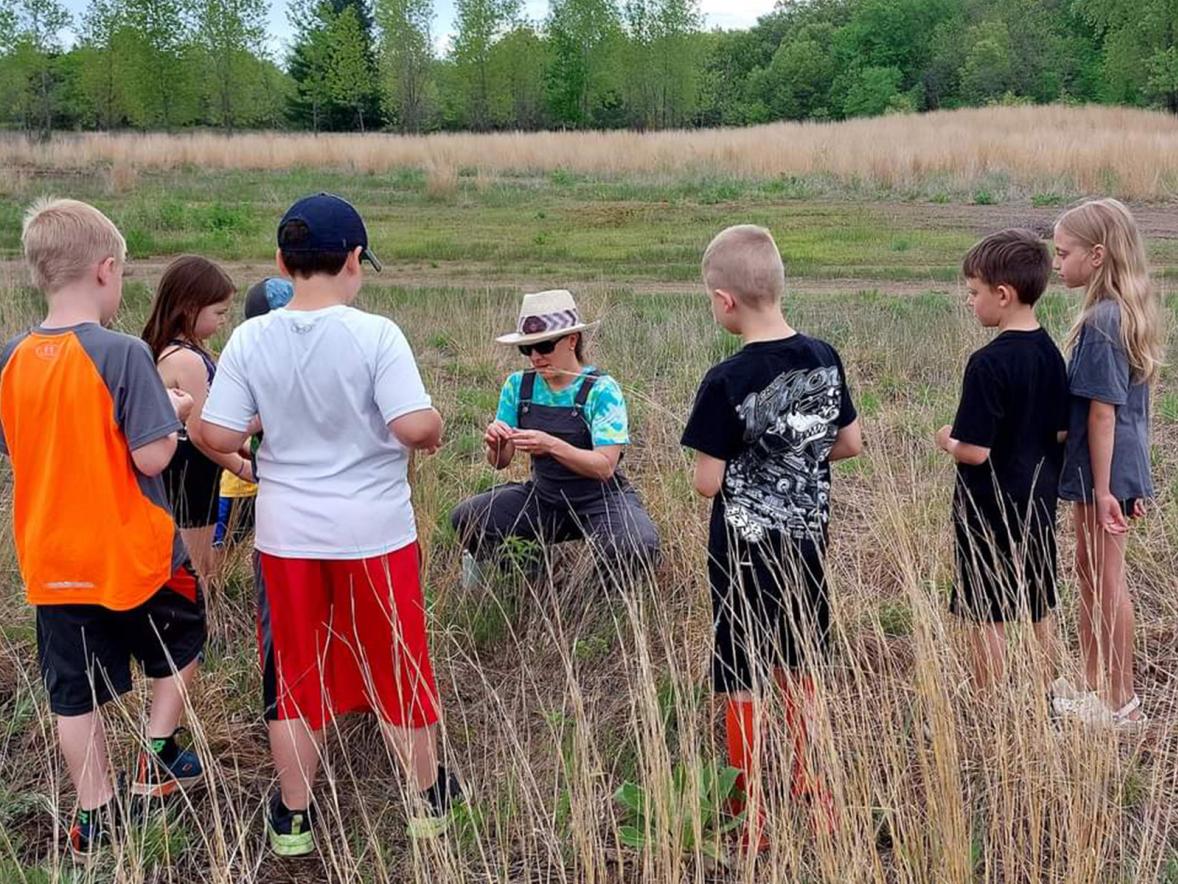From March 2020 to this past May, University of Wisconsin-Stout’s UW-Sprout Garden lay fallow, its once-carefully tended rows choked out by 6-foot-tall weeds. Twelve-foot-tall raspberries towered over the fence and flowering bulbs, like garlic, overcrowded.
The one-fifth acre garden on north campus, started in 2014, was unattended because of COVID-19 – the garden had closed with concerns for student interns’ health. “Six years of work and care was eradicated by one season of inattention,” said Arthur Kneeland, senior lecturer in the biology department.
But this summer, four student interns helped rejuvenate the garden, pulling weeds by hand and bringing the beds back to life: Abby Cullen, environmental science, Menomonie; Sophia Natzke, environmental science, Rochester, Minn.; August Pennington, environmental science, North Branch, Minn.; and Grace Minder, applied social science, St. Paul.
When Cullen and Natzke first stepped into the overgrown garden, they had recently taken a Plant Taxonomy class. “I thought, ‘Let’s flex our knowledge on this mass of weeds,’” Natzke said.
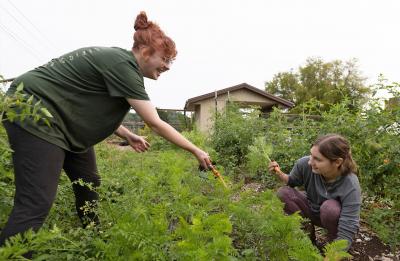
The garden is now thriving – vines are loaded with tomatoes and cucumbers. Lettuce varieties paint a pallet of shades of green across the ground. Kneeland, Cullen and Natzke snacked on carrots as they stooped to identify columbine and verbena in the pollinator garden.
“We see such a variety of insects. It speaks to the health of the garden,” Cullen said. “But the competition keeps their numbers down.”
Kneeland, who also serves as the garden adviser and internship coordinator, knows the students are passionate about what they do. Averaging about 20 hours a week, they are often in the garden two or three hours by the time he arrives, he said.
“The more the students do for the garden, the better. It was a daunting task getting it up and running again, but they persevered.
“So much knowledge was lost and regained,” Kneeland added. “The garden is a learning lab, where students learn more than just knowledge. It’s a great opportunity for them because of Stout’s technical components. Giving students this experience is important.”
Providing sustainable food for campus
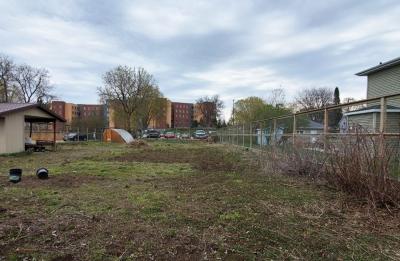
Before COVID-19, UW-Sprout had a Community Supported Agriculture program, selling produce shares to students, faculty and staff.
Now, the garden’s main objective is to provide sustainable food and high-quality produce to students through University Dining, operating by donation, while recording its interactions. Kneeland also hopes to donate to Stepping Stones in the future.
With much of the produce in season, the students have been harvesting daily, delivering fresh bushels to dining.
“The lessons learned in small-scale agriculture are different,” Kneeland said. “We fend off groundhogs and battle thistles – that’s gardening. But what’s profitable? There’s the learning aspect where students experience growing food versus just dollars and cents from sales.
“What’s most important is that students get to eat the vegetables from the garden.”
Cullen and Natzke are interested in sustainability, including sustainable farming. Natzke enjoys gardening by hand and bringing food directly from the garden to people, she said.
Cullen’s focus on sustainability is an easy way for her to control how she impacts the Earth, she said. “Locally sourced food is responsible. We don’t use herbicides, pesticides or synthetic fertilizers in the garden. We can reduce the ripple effect and help keep our soil and waterways cleaner.”
Deep winter greenhouse
UW-Sprout is also exploring the possibility of building a deep winter greenhouse to allow for vegetable production through the colder months and provide food for students year round.
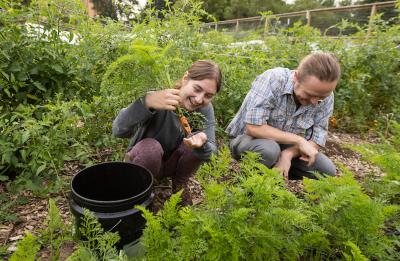
“A deep winter greenhouse is a model for another way to do agriculture. It’s high-tech farming,” Kneeland said. “In Wisconsin, our tomatoes in the winter months come from Canada and Mexico. That’s something we could be doing locally.”
Natzke, who tried the first tomato she ever liked this summer, said the greenhouse would enable above ground plants, like spinach, lettuce and arugula, and shade-tolerant plants to be grown over the winter. The students are writing a proposal and waiting on designs and cost estimates from UW-Stout Facilities.
“The design is based on a concept from the University of Minnesota,” Cullen said. “We’re also hoping to have one or two full-time students to work over the winter and that we can trade off funding with dining.”
The building process is complex, however, as they explore the architectural parts and costs with facilities, Kneeland said. “Building anything on campus is far more complex than building things personally. Once those steps are completed, we will have an idea of the final cost and can explore funding via UW-Stout Green Fee and other sources.”
The greenhouse will work by injecting air into the ground to produce warm air to circulate around the produce, Kneeland explained. It will run on electricity, but Cullen and Natzke hope to install solar panels and hydroponics in the future.
Kneeland attended graduate school at University of Wyoming, Laramie, which at the time had a small campus garden with one hoop house. “Now their garden has five greenhouses,” he said. “It’s amazing to see what students can do, to see what happens when you let it grow.”
UW-Sprout is seeking student volunteers to help with harvesting. Students are invited to the garden on Sundays at 10 a.m. The garden is at 214 4th St. W., behind Red Cedar Hall. “Everybody gets to eat when they’re working here and leaves with something too,” Kneeland said.
Students and volunteers will harvest until the frost sets in. Then they will remove plants for compost, plant garlic and put the garden to bed, preparing it for winter.
The UW-Sprout internship is a paid opportunity supported by the Sustainability Office and the College of Science, Technology, Engineering, Mathematics and Management Dean’s Office. Students may choose to earn credit for their experience by enrolling in UW-Stout’s Cooperative Education and Internship Program.
The university also offers a sustainability minor, a master’s in sustainable management and a professional science master’s in conservation biology.





